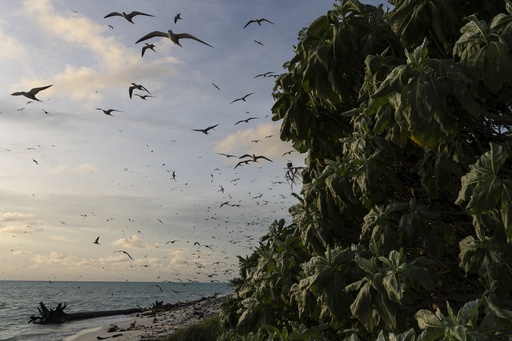
Located in one of the most secluded corners of the world, the few rangers tasked with safeguarding Helen Reef, a biologically rich ecosystem, often find themselves alone for months on end. They confront challenges such as dwindling fuel supplies for their vessel patrols, limited access to fresh drinking water, and the constant threat of rising ocean levels eroding the small island that hosts their facilities.
Despite the adversities, there is a silver lining: the fishing around Helen Reef is second to none, and these select rangers are granted exclusive rights to fish there.
Spanning 40 square miles at the southern edge of Palau, Helen Reef boasts a wealth of life, including rare species such as the Napoleon wrasse, bumphead parrotfish, hawksbill sea turtles, and sea cucumbers. Over 500 varieties of fish, giant clams, sharks, and manta rays thrive within its protective waters, alongside numerous species of hard and soft coral. On Helen Island, the small area that just rises above sea level, thousands of birds including boobies, frigate birds, and terns transform the sky into a vibrant tableau, while green sea turtles come ashore annually during nesting season in July.
This rich marine diversity has attracted the unwanted attention of poachers, prompting the crucial interventions of the Hatohobei State Rangers. Typically, four rangers are stationed at the reef at a time for three-month stretches, undertaking patrols to enforce the conservation laws established by Palau.
According to Hercules Emilio, a senior conservation officer with 17 years of experience in the role, the reef carries significant cultural importance. “It’s a reef our ancestors used to go to and harvest food for the community back in the days. So to us, we are still conserving the resources that we have there, that’s why we do the enforcement,” he remarked.
Every three months, supplies such as fuel, food, and essential items are transported to the rangers aboard a chartered boat that takes two days to cover the distance from Koror, approximately 360 miles away, where most of Palau’s population resides. The low tides complicate this delivery since boats cannot dock directly at the ranger station, requiring goods to be manually carried ashore. The ranger station, marked by peeling blue paint, features living quarters, a radio room, and a communal lounge that welcomes the ocean breezes. A separate building houses their kitchen with a trio of free-roaming chickens, while rainwater is collected in large drums for drinking, which often nears depletion during dry spells.
When not on patrol, the rangers engage in maintenance of the station, raise chickens, and gather shorebirds like the bridled tern for their eggs and meat. The abundance of nesting birds makes them an accessible food source on an island where their sounds can carry for hundreds of yards along the shoreline.
Though isolation can be challenging, the rangers feel empowered by their role as custodians of a location vital to their ancestral lineage. “It feels good,” shared Emilio, who hails from a nearby small island and whose spouse is also a ranger. “For me, I’m doing something for the people of my community.”
Palau, an archipelago of numerous islands, is home to only about 20,000 residents, with the sparsely populated Hatohobei state, which includes Helen Island and Reef, having just a few dozen inhabitants. This reef is among the 39 areas designated within Palau’s Protected Areas Network, which receives support from a nonprofit fund that capitalizes on visitor fees.
A significant hurdle for the rangers is managing their boat fuel, with around 100 gallons needed to last through the three-month operational period. They often juggle between standard patrols and fishing expeditions to ensure they have enough sustenance. “Sometimes we don’t have enough fuel to patrol and then go fishing. So we go at the same time,” explained ranger Tony Chayum.
Without cellular service on the island, the rangers utilize a limited single sideband radio to stay connected with colleagues on the more populated northern islands of Palau. This radio is their lifeline for relaying information to family during special occasions and reporting any illegal activities encountered in the area. An example of this occurred in 2021 when a Chinese fishing vessel sought to extract sea cucumbers and clams from the protected waters. “We didn’t allow them. They offered money and some goods, which we didn’t take,” Emilio recounted. Following this incident, the ship was escorted to Koror state and penalized for the breach of marine laws.
Currently, the escalating threat of climate change equally concerns the rangers as much as poaching. Ray Marino, the governor of Hatohobei state, has documented a disturbing progression from minor erosion to significant land loss. “Of course, we can only blame it on climate change; there is no other reason for it,” he stated.
In response to the plight of their island, the rangers are exploring solutions like installing wooden barriers to mitigate erosion. “What we are worried about is the disappearance of the island,” Emilio expressed, conveying a poignant reminder of the challenges faced by those working to protect this vital ecosystem.
